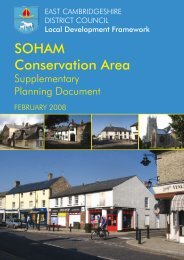East Cambridgeshire District Council Water Cycle Study Detailed ...
East Cambridgeshire District Council Water Cycle Study Detailed ...
East Cambridgeshire District Council Water Cycle Study Detailed ...
Create successful ePaper yourself
Turn your PDF publications into a flip-book with our unique Google optimized e-Paper software.
Stage 2 <strong>Water</strong> <strong>Cycle</strong> <strong>Study</strong>: Final Report<br />
Sept 2011<br />
41<br />
<strong>Cambridgeshire</strong> Horizons<br />
<strong>East</strong> <strong>Cambridgeshire</strong> – <strong>Detailed</strong> WCS<br />
• in the UK, there has been relatively little research on toxins in streams, lakes and sediments,<br />
as the problems are thought to be limited. However, climate change may alter this perception.<br />
Climate change studies, especially in relation to water quality and ecology, are at fairly early<br />
stages and the outcomes are subject to considerable uncertainty. However, understanding the<br />
processes and mechanisms controlling water quality and ecology, and how these combine and<br />
interact, is essential for sustaining potable water supplies and conserving river systems. 30 As<br />
such, the findings of this study and planned adaptation and mitigation options should be<br />
updated when further research and guidance becomes available.<br />
One of the key climate change adaptation challenges will be managing increased wastewater<br />
flows (from new developments) while protecting the water environment in the area, particularly<br />
where the impacts of climate change on the water environment are still uncertain. The <strong>Detailed</strong><br />
WCS has undertaken a sensitivity analysis on the vulnerability of water quality to climate<br />
change impacts through assessing the impact of reduced summer flows on dilution of<br />
wastewater discharges. A broad brush sensitivity was undertaken using RQP whereby the<br />
Q95 of the receiving watercourse has been reduced by 20% to model a reduction in summer<br />
flows. The consent requirements for the WwTW were then determined assuming the WFD<br />
objective of ‘no deterioration’ under these conditions compared to those under the existing<br />
climate. These results are summarised in Table 3-7. It should be noted that only WwTW that<br />
have data for river flows in the receiving watercourses have been assessed as the RQP<br />
analysis cannot be undertaken without estimates of river flow statistics.<br />
The assessment shows that under potential future climates, WwTW consents are likely to need<br />
to be tighter than existing consents, but in the majority of cases these are small changes and<br />
discharge consents are still within the LCT.<br />
Climate change, water quality and adaptation<br />
Table 3-8 provides a summary of the potential climate change adaptation and mitigation<br />
measures that could be considered in the <strong>East</strong> <strong>Cambridgeshire</strong> <strong>District</strong> with regards to water<br />
quality and wastewater services infrastructure. The organisations likely to be responsible for<br />
leading these measures have been identified alongside the suggested timescale for these<br />
actions to start being taken forward (Immediate, Medium (1 - 10 years) and Long (10+ years)).<br />
30 Potential Impacts of Climate Change on River <strong>Water</strong> Quality. Science Report SC070043/SR1, Environment Agency 2008






